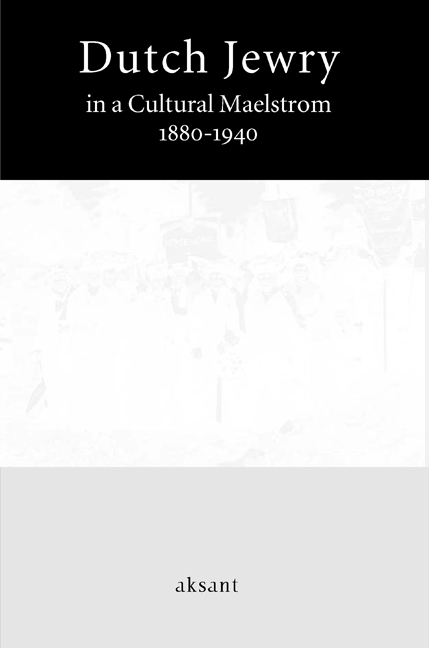Book contents
- Frontmatter
- Contents
- Foreword
- The New “Mosaik”: Jews and European Culture, 1750-1940
- The Politics of Jewish Historiography
- “The First Shall be the Last”: The Rise and Development of Modern Jewish Historiography in the Netherlands Until 1940
- Epigones and Identity: Jewish Scholarship in the Netherlands, 1850-1940
- Judaism on Display: The Origins of Amsterdam's Jewish Historical Museum
- De Vrijdagavond as a Mirror of Dutch Jewry in the Interbellum, 1924-1932
- “Holland is a Country which Provokes Serious Reflection…”: Images of Dutch Jewry in the German Jewish Press
- Spinozism and Dutch Jewry between 1880 and 1940
- Spinoza's Popularity in Perspective: A Dutch-German Comparison
- Mozes Salomon Polak: Jewish “Lerner” and Propagator of Freemasonry, Spiritualism, and Theosophy
- Jewish Women, Philanthropy, and Modernization: The Changing Roles of Jewish Women in Modern Europe, 1850-1939
- Roosje Vos, Sani Prijes, Alida de Jong, and the others: Jewish Women Workers and the Labor Movement as a Vehicle on the Road to Modernity
- Stemming the Current: Dutch Jewish Women and the First Feminist Movement
- Dutch Jewish Women: Integration and Modernity
- Index of Names of Persons
- Index of Subjects
Spinozism and Dutch Jewry between 1880 and 1940
Published online by Cambridge University Press: 26 January 2021
- Frontmatter
- Contents
- Foreword
- The New “Mosaik”: Jews and European Culture, 1750-1940
- The Politics of Jewish Historiography
- “The First Shall be the Last”: The Rise and Development of Modern Jewish Historiography in the Netherlands Until 1940
- Epigones and Identity: Jewish Scholarship in the Netherlands, 1850-1940
- Judaism on Display: The Origins of Amsterdam's Jewish Historical Museum
- De Vrijdagavond as a Mirror of Dutch Jewry in the Interbellum, 1924-1932
- “Holland is a Country which Provokes Serious Reflection…”: Images of Dutch Jewry in the German Jewish Press
- Spinozism and Dutch Jewry between 1880 and 1940
- Spinoza's Popularity in Perspective: A Dutch-German Comparison
- Mozes Salomon Polak: Jewish “Lerner” and Propagator of Freemasonry, Spiritualism, and Theosophy
- Jewish Women, Philanthropy, and Modernization: The Changing Roles of Jewish Women in Modern Europe, 1850-1939
- Roosje Vos, Sani Prijes, Alida de Jong, and the others: Jewish Women Workers and the Labor Movement as a Vehicle on the Road to Modernity
- Stemming the Current: Dutch Jewish Women and the First Feminist Movement
- Dutch Jewish Women: Integration and Modernity
- Index of Names of Persons
- Index of Subjects
Summary
At the end of the nineteenth century, after two centuries of apathy, Dutch Jewry grew increasingly interested in Spinoza (1632-1677), the controversial philosopher expelled from its ranks in 1656. The first part of this paper will outline the study of Spinoza by Dutch Jews between 1880 and 1940. Their research into the historical and cultural background of Spinoza, however, did not amount to Spinozism, for his philosophy was in general left aside. In the second part we will contend that Protestants and trained theologians almost exclusively dominated pre-war Dutch Spinozism. Finally, a cautious attempt to explain the lack of a real Spinozism among Dutch Jews – a remarkable phenomenon both in national and international respect – will be offered.
SPINOZA AND OFFICIAL JEWRY
In 1927 – the 250th anniversary of Spinoza's death – and in 1932 – the 300th anniversary of the philosopher's birth – Spinozism in the Netherlands reached its zenith. As a result of these commemorations the first study of Spinoza's thought was published by a Dutch Jew. This study consisted of a series of articles written by Benzion Joachim Hirsch (1880-1943) and appeared in the Jewish cultural weekly De Vrijdagavond (Friday Evening). Its main purpose was to denounce the so-called spinozification of Judaism. According to Hirsch, practically all Jews, religious and non-religious, were united in their enthusiasm for this “great Jew”, that although the “sanctification of Spinoza” did not apply to Jews only – its history actually started with “the prominent liberal Christian circles of Western Europe in the beginning of the nineteenth century” – Jewry had surrendered itself completely to Spinoza. In support of his thesis the author refers to many Jewish Spinozists, especially from Germany, the United States, and Great Britain. Dutch names, however, are conspicuously absent. In 1932, these articles were followed by a booklet on Spinoza's main work: the Ethics.
Hirsch, the younger brother of the chief rabbi of Overijssel (appointed in 1902), ran a cigar store. According to his granddaughter Mrs. N. Mayer-Hirsch, his contemporaries considered him to be an unequalled autodidact. On account of his publications on Spinoza, the chief rabbi A.S. Onderwijzer conferred on him the chower-title. The reason for writing these studies, Hirsch observed, was a general tendency to regard Spinoza's philosophy as Jewish. This tendency had been revealed during the commemorative years of 1927 and 1932.
- Type
- Chapter
- Information
- Dutch Jewry in a Cultural Maelstrom1880-1940, pp. 103 - 120Publisher: Amsterdam University PressPrint publication year: 2008



